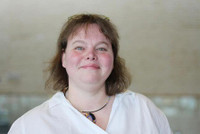
For our weekly ‘Ideas on Europe’ editorial by UACES, the University Association for European Studies, we have the pleasure to welcome once more Simona Guerra, from the University of Surrey, in the UK.
Very happy to have you back with another untold story of ‘the early women of European integration’. After Käte Strobel last November, and Nilde Lotti in March, who will be in your portrait today ?
For my third profile, I have chosen Marguerite De Riemaecker-Legot, born on 9 March 1913 in Oudenaarde, East Flanders, in Belgium.
Between 1931 and 1936 she attends the Law School at the University of Ghent. That is still unusual at the time, although the lawyer profession had opened to women in 1922. It is telling that the diploma certificate was standardised only for men, which meant that in her certificate ‘she’ needed to be handwritten over ‘he’. It was also challenging to find a patron to get started in the profession, but she was helped by her professor and senator Maurice Orban. While working in Brussels for Pierre Nothomb, a Belgian writer and politician, she came into contact with Maria Baers, a senator and advocate for women’s rights. Marguerite left her work to become cabinet secretary to Mrs Baers. In 1938 she got married and had two sons, Xavier and Christian, who has left a book and a few pictures of her extraordinary life.
When did she stand for election herself ?
Marguerite De Riemaecker-Legot was elected as a Member of the Belgian Parliament in 1946, although it was only in June 1949 that all women could participate in parliamentary elections for the first time at the national level.
In her national parliamentary experience, she started to work on those issues she had herself experienced, as on a bill on ‘granting equal rights to men and women with regard to the exercise of public functions’. In 1947 she submitted a bill on the ‘authorization of women to exercise the office of lawyer at the Court of Cassation’ and one on the ‘admission of women to the magistracy’.
She was the first woman in the Belgian Parliament, the first Belgian woman in the European Parliament in 1958, and the first woman Minister in Belgium in 1965. She submitted fourteen bills, was appointed rapporteur on more than forty bills, and, in Europe, she was appointed as rapporteur for two legislations that followed her interest devoted to women, families, and workers.
What did she do exactly for workers’ rights ?
In 1956, a record number of 46,000 Italians moved to Belgium, most of them for the coal mines. Until the end of 20th century, they represented the biggest immigrant group.
On 12 January 1960, Marguerite de Riemaecker took the floor to highlight the difference between ‘residence’ and ‘domicile’, pointing out that Italians in Belgium had definitely changed their residence, but did not benefit from change of ‘domicile’ and the civic and political rights that went with it. In her words, as rapporteur of the (European) Social Funds, these had to be delivered for the wellbeing of mobile workers and their opportunity to travel. The institution of Social Funds was perceived among the members of the Social Affairs Committee as a small step, but they were moved by the social and political context of the time. After consulting with the Committee on Economic Affairs, the solutions offered show the interest and influence of the young Parliament on social policy, something that Mechthild Roos has already spoken about in your programme.
That’s right, she called it the “self-empowerment” of the young Parliament.
And Marguerite De Riemaecker-Legot represented exactly this capacity of the Parliament of putting pressure on the other European institutions, and its smart ability of using cooperation and consultation across different members and committees for a role that the Treaties did not even consider.
Just like in your previous cases, your research shows that women were active political actors in the early stages of the European integration process.
And yet they have been undocumented, given little or no importance. Recognizing these voices and experiences is crucial, not only for the past but also for the future. The persistent lack of women on some specific positions in the EU has critical policy consequences, as should have the experiences of women during the economic crisis, the pandemic, and Conference on the Future of Europe.
Recognizing and acknowledging this deficit in European studies can help us teach and learn the history of European integration without transmitting the same old bias. Political socialization is likely to affect descriptive representation in the long term, and familiarizing with the names and work of these women can be a strong symbolic factor. Again: it is time to write about them in the textbooks and to know about them as makers and shapers of the European integration process.
I could not agree more. Thank you so much, for sharing the findings of your historical research with us. I recall you are Senior Lecturer at the University of Surrey, in England.
This contribution is based on the CAROLINE research projet (‘Creating A netwoRk On femaLe pIoNEers’ of European integration). A first research paper was presented in April 2023, at a conference on women in the narrative on European integration organized by Professors François Klein and Elena Danescu at the University of Luxembourg, and has been accepted for publication in the journal Politique Européenne.
Interview by Laurence Aubron.





